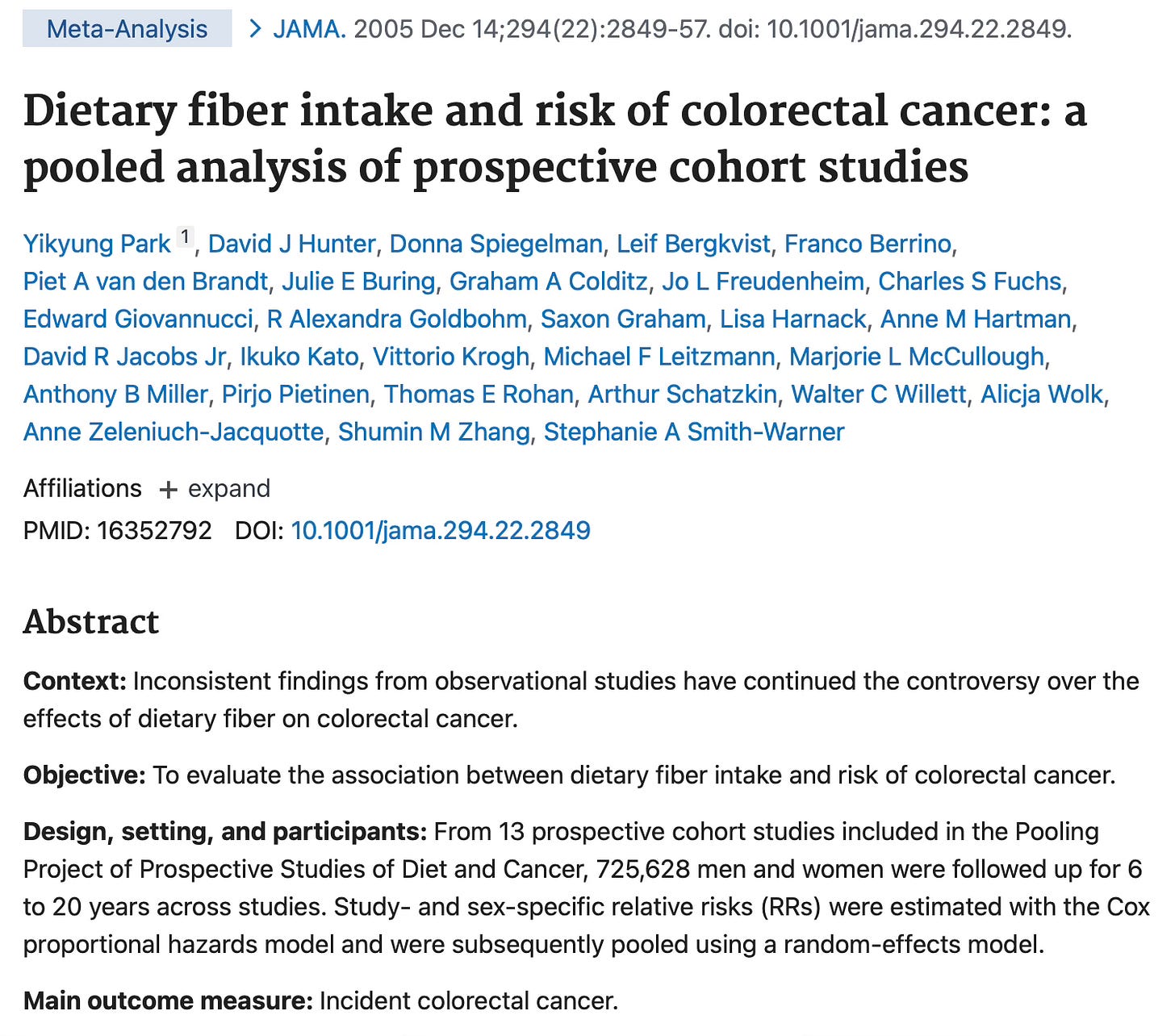Do You Need To Add Fiber On A Carnivore Diet, Or Any Diet?
A closer look at the claims and the research.

There are many ideas floating around the healthcare space people believe are 100% true. If the medical community says something often enough, and in enough places, people will believe it. This is true for most things, not just healthcare.
Here’s a list of things most people believe to be true but are actually false:
Counting calories leads to successful weight loss
Saturated fat causes heart disease
Sugar free foods are healthier
Butter and beef are unhealthy
A chicken salad with low calorie dressing is the healthiest thing you can eat
Green drinks are healthy
Shakes are great meal replacements
If it’s low calorie, low fat, all natural, gluten free, and non-gmo project verified it’s healthy.
I could go on but I hope you get my point.
What’s My Take On Fiber?
If you know my story you know fiber is one of the reasons I went carnivore. Prior to going carnivore I was autoimmune paleo with a few introductions. At the time I was a huge Terry Wahls fan; I still am. I’ve shared her Ted Talk more than any other. She went from a wheelchair to a mountain bike despite having secondary progressive multiple sclerosis.
Again, most people believe once you have MS nothing can be done and nothing can be improved. Also not true.
Terry was able to improve her health by simply changing her diet. As a physician she’d had all the best treatments and seen her share of specialists. It wasn’t until she changed her diet that she finally achieved results. She’s one of the reasons I always ask people what they’re eating when they complain of any ailment.
Part of her protocol is 9 cups of vegetables a day. I ate autoimmune paleo emphasizing 9 cups of vegetables a day from the 3 groups she recommends.
Then I went skiing. Since I didn’t get to go very often I skied until it was a challenge to walk to my car. This is how I’ve always skied. I don’t go home because I’m done skiing. I go home because my legs are tired and I don’t want to fall and get hurt.
Anyway, after that ski day I had what I think was an autoimmune flare. I didn’t have energy for anything other than lying on the couch. This has never happened to me before nor has it happened since. That was the winter of 2017.
It didn’t sit well with me. If I “ate better” than most people why did a day of skiing knock me on my butt for a week?
Autoimmunity begins in the gut. When undigested food particles leak out of the small intestine (aka leaky gut) the body builds an autoimmune response. The autoimmune disease your body develops is typically tied to family history. My great grandmother was bound to a wheelchair with rheumatoid arthritis - what I think I have.
Learning about lectins and gut health I wondered if fiber was simply too irritating for some of us, especially if you’re trying to heal your gut lining.
Ultimately I believe everyone is a unique individual but I also can’t deny the success many find when they follow a carnivore diet. Those with autoimmunity often find remission of their symptoms. People with metabolic syndrome find lasting weight loss success, sometimes for the first time in their life. As you see below there was a 90% improvement in all diseases.
Naturally as a carnivore it’s all meat, fish, and salt on the most restricted version, no fiber. Some add dairy. Some add coffee. And those who call themselves animal based add low toxin fruits (IMHO the fruits won’t work for most people).
Why Would Your Gut Be Sensitive To Fiber?
Why do so many of us struggle with gut health and the diseases associated with leaky gut? In the 90’s GMOs entered our food system. The Bt toxin found in GMO corn ruptures the stomach of the insect that would typically eat it. It’s not just corn, there is an extensive list of food additives that are made from GMO corn. Then the glyphosate sprayed on GMO and NON-GMO crops affects more than 1/2 of gut bacteria.
My other great grandmother was born in 1889 and lived to be 104. I can’t imagine she sat around with her friends discussing who tolerated wheat, dairy, and food in general.
Our guts have been under attack from GMOs, food additives, anti-bacterial everything, and all the chemicals of our lives.
Does A Proper Human Diet Include A Lot Of Fiber?
Early humans were hyper-carnivorous for nearly 2 million years. You also have to remember that they didn’t know what a calorie was and they exclusively ate locally and in season. Edible plants are available a fraction of the year in northern latitudes.
Imagine you suddenly had to live in the wilderness. Which food source is most likely to be poisonous? Plants or Animals? i.e. while we may have had fiber on occasion they definitely didn’t add Metamucil to their water.
We were fat hunters because fat contains more calories per gram than protein or carbohydrates. It’s also incredibly filling which is useful when you don’t have a convenience store on every corner like we do today. If I put a jar of coconut oil or a stick of butter in front of you do you think you could eat the entire thing?
What’s so special about fat? It helps you have a smooth move ;)
One of the places people often reference when making health decisions is the Mayo Clinic. There are others but Substack limits the amount of words I can put in an e-mail.
Mayo Clinic Myths About Fiber:
Normalizes bowel movements. Dietary fiber increases the weight and size of your stool and softens it. A bulky stool is easier to pass, decreasing your chance of constipation. If you have loose, watery stools, fiber may help to solidify the stool because it absorbs water and adds bulk to stool.
How does this even make sense? If you have trouble passing what’s there why would you add to the load? As it turns out reducing fiber reduces constipation.
What did they find in the study?
Results: The median age of the patients (16 male, 47 female) was 47 years (range, 20-80 years). At 6 mo, 41 patients remained on a no fiber diet, 16 on a reduced fiber diet, and 6 resumed their high fiber diet for religious or personal reasons. Patients who stopped or reduced dietary fiber had significant improvement in their symptoms while those who continued on a high fiber diet had no change. Of those who stopped fiber completely, the bowel frequency increased from one motion in 3.75 d (± 1.59 d) to one motion in 1.0 d (± 0.0 d) (P < 0.001); those with reduced fiber intake had increased bowel frequency from a mean of one motion per 4.19 d (± 2.09 d) to one motion per 1.9 d (± 1.21 d) on a reduced fiber diet (P < 0.001); those who remained on a high fiber diet continued to have a mean of one motion per 6.83 d (± 1.03 d) before and after consultation. For no fiber, reduced fiber and high fiber groups, respectively, symptoms of bloating were present in 0%, 31.3% and 100% (P < 0.001) and straining to pass stools occurred in 0%, 43.8% and 100% (P < 0.001).
Conclusion: Idiopathic constipation and its associated symptoms can be effectively reduced by stopping or even lowering the intake of dietary fiber.
What About Fiber and Cancer?
Another Mayo Clinic Myth:
Helps maintain bowel health. A high-fiber diet may lower your risk of developing hemorrhoids and small pouches in your colon (diverticular disease). Studies have also found that a high-fiber diet likely lowers the risk of colorectal cancer. Some fiber is fermented in the colon. Researchers are looking at how this may play a role in preventing diseases of the colon.
Mayo Clinic, Dietary Fiber, and Cholesterol:
The claim:
Lowers cholesterol levels. Soluble fiber found in beans, oats, flaxseed and oat bran may help lower total blood cholesterol levels by lowering low-density lipoprotein, or "bad," cholesterol levels. Studies also have shown that high-fiber foods may have other heart-health benefits, such as reducing blood pressure and inflammation.
First off, if you’ve been reading my newsletters you hopefully already know cholesterol isn’t a problem nor has it ever been. Most of the cholesterol circulating in your body is made by your liver. Every cell wall, hormone, immune system, brain, nervous system, and intrinsic Vitamin D production all require cholesterol.
Most of the foods people eat with a high fiber claim (grains) are inflammatory which is the ultimate cause of cardiovascular disease.
The Mayo Clinic’s Take on Blood Sugar and Weight Loss via Fiber:
Helps control blood sugar levels. In people with diabetes, fiber — particularly soluble fiber — can slow the absorption of sugar and help improve blood sugar levels. A healthy diet that includes insoluble fiber may also reduce the risk of developing type 2 diabetes.
Aids in achieving healthy weight. High-fiber foods tend to be more filling than low-fiber foods, so you're likely to eat less and stay satisfied longer. And high-fiber foods tend to take longer to eat and to be less "energy dense," which means they have fewer calories for the same volume of food.
While fiber can slow the body’s absorption of sugar at the end of the day it’s still sugar. If the worst thing you eat in a day is a vegetable you’re doing better than someone relying on processed food.
But I don’t think we have a chronic disease epidemic because people are getting too much fiber from vegetables. Most of the fiber people eat comes from grains. Considering 1 slice of wheat bread raises your blood sugar more than a Snickers bar this isn’t a winning strategy for blood sugar levels or weight loss.
Even though the pear and bread have more fiber they also will spike your blood sugar more…
Always question what you think you know. And when you’re done question it again. - Jen
Take a walk through any grocery store and you’ll see they’ve added fiber to a lot of unhealthy foods so they can make the heart healthy claim on the front of the box. They even do this with foods marketed as keto.
Keto ice cream for instance is still ice cream, they’ve just added fiber and sugar alcohols so they can play the net fiber game. Subtract the fiber and sugar alcohols from the total amount of carbohydrates and POOF, MAGIC it’s keto ice cream.
Refer to the Carnivore Diet by Harvard above when considering which foods help with blood sugar and weight loss. I don’t think fiber was an ingredient…
Meat is the perfect food to control blood sugar and support weight loss because it contains little to no sugar, it’s a complete protein, and satiating fat.
The Last Bullet Point From The Mayo Clinic:
Benefits of a high-fiber diet
A high-fiber diet:
Helps you live longer. Studies suggest that increasing your dietary fiber intake — especially cereal fiber — is associated with a reduced risk of dying from cardiovascular disease and all cancers.
Do you still believe them based on the research listed above? Cereals are the epitome of refined grains meaning the fiber has been broken down - making them a sugar bomb for most people.
Ultimately to know how something affects your blood sugar it’s best to test your blood sugar before and after eating a single food.
Two Of My Favorite Docs Discuss The Fiber Lie
Did you know that you can gain access to all of my content when you refer a friend to Carnivore Woman Secrets? Refer 5, 10, or 15 friends to gain free access to my paid content.










